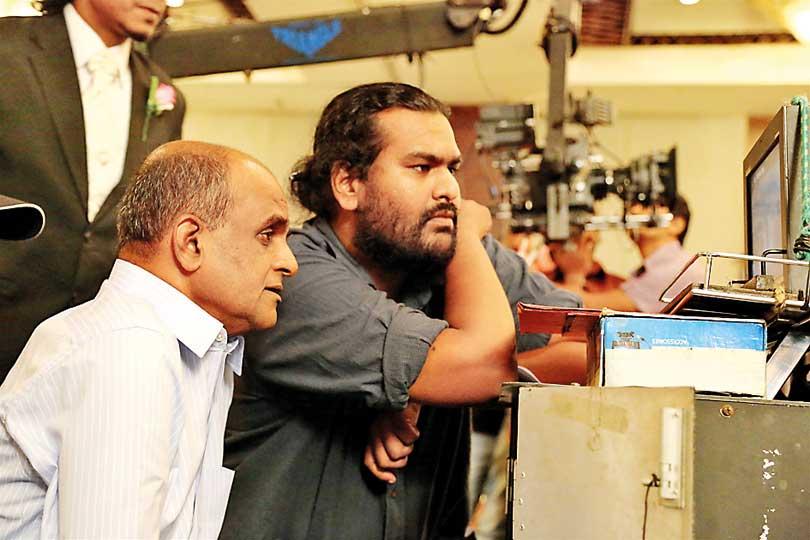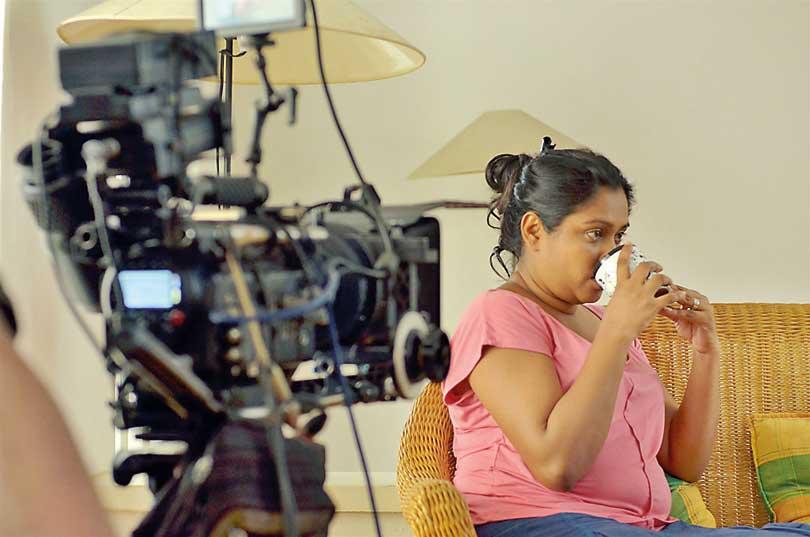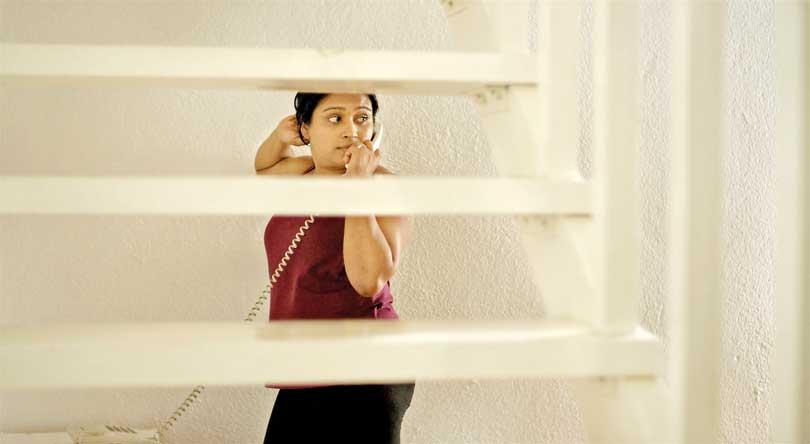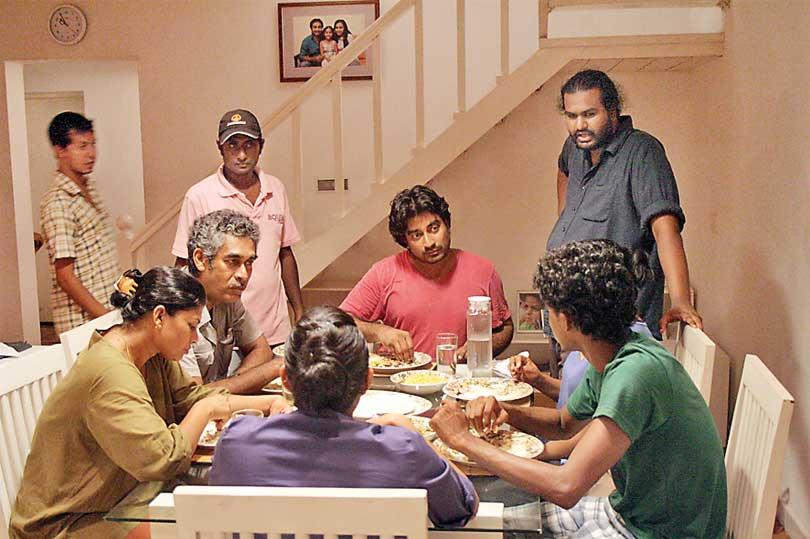03 Apr 2019 - {{hitsCtrl.values.hits}}

 Marital infidelity, or assumption of it, isn’t a new theme to Sri Lankan cinema. The black and white era offers many examples of wives being treated unspeakably because their husbands imagined things. The wife was always a virtuous woman and the husband a drunkard. Of course, it would never occur to her to find comfort in the arms of another man. That would be sacrilege.
Marital infidelity, or assumption of it, isn’t a new theme to Sri Lankan cinema. The black and white era offers many examples of wives being treated unspeakably because their husbands imagined things. The wife was always a virtuous woman and the husband a drunkard. Of course, it would never occur to her to find comfort in the arms of another man. That would be sacrilege.
By the 1970s, social progress, such as it was, meant that a wife could be tempted to go for it even if the husband wasn’t a womanizer and philanderer. But she paid the ultimate penalty of being murdered (Wijeya Dharmashri’s ‘Duhulu Malak’). To stay alive, one had to remain unconditionally virtuous. Lester James Pieris examined the complexity and unpredictability of young love in a mature fashion in ‘Ran Salu,’ but such essays were the exception rather than the norm.
Towards the late 1970s and into the ’80s, bolder filmmakers such as Dharmasiri Bandaranayake took a new take on this age old theme, examining thematically states of mind rather than virtue as an unassailable tradition. His movies such as ‘Hansa Wilak’ and ‘Suddilage Kathawa’ were breakthroughs in more than one sense, treating women as flesh and blood creatures rather than sacred cows. But such ‘radical’ treatment of the feminine psyche (or mystique) still remains the exception rather than the rule in formula and tradition worshipping Sri Lankan cinema, where the virtue of actors, in or out of the screen, is everything.
‘Dekala Purudu Kenek’ introduces a new element into a story line which examines the theme of marital infidelity, and that is ambiguity. Did she or didn’t she? As the movie starts, we find a young married couple with a small child trapped in a loveless marriage. Sachithra (Bimal Jayakody) accuses Dinithi (Samadhi Laksiri) of not just having an affair before they got married, but carrying on with it as of now.
She is practically a prisoner in the house. He has confiscated her mobile phone and locks the land phone when he goes out. Her closest confidante is her brother Sanka (Jagath Manuwarna), to whom she confesses about her old affair. According to her, it was her first taste of true love and physical passion even though she and Sachithra married after a love relationship.

Parental intervention is useless. Dinithi sees no way out of the impasse and asks Sachithra for a divorce, which he firmly refuses. It’s his way of exacting revenge. When confronted with her ongoing affair (which we don’t see) she remains ambiguous, neither denying nor confirming. Is that her way of exacting revenge? Male authority is battered by obstinate female silence. In this tug of war, there are no winners, only stubborn, long-suffering losers.
It is this element of ambiguity which makes this movie (director Malith Hegoda, screenplay Boopathy Nalin Wickamage) different from its predecessors. As the director puts it in an introductory note: “The reality of the modern day individual is that it is easier to be connected with hundreds of people across the globe, than with the person across the table. A status update on Facebook is easier to give than a real smile. Connectedness is a thing of the present. Communication is a thing of the past.
By the 1970s, social progress, such as it was, meant that a wife could be tempted to go for it even if the husband wasn’t a womanizer and philanderer. But she paid the ultimate penalty of being murdered (Wijeya Dharmashri’s ‘Duhulu Malak’)
“Being middle-class in Sri Lanka means the same thing as being middle-class anywhere else in the globe. It means having direct and constant access to the cutting edge of the world… but being middle-class in Sri Lanka also means, that, whatever one may have at one’s fingertips, one is still wading knee-deep in inherited culture and tradition, and this comes into play most intensely within the folds of marriage… this pull in different directions leaves many young married people feeling stranded.”
The director also comments on violence in the form of ‘non violence’ – “the situation that we will observe in this film is exceedingly normal. There is no overt violence. And, for me, this is the most dangerous aspect of it.”

Sachithra doesn’t hit his wife, though he once pushes her away, and she doesn’t throw the porcelain at him. But they break each other down with a silence as cold as a body in the morgue. When she appeals for love and tenderness, he remains frozen. His ‘lovemaking’ is so mechanical that he could be a robot on top of a pair of legs. On the other hand, how is sex possible within this broken down format? Is that his way of exacting revenge?
One is relieved when this domestic horror show ends. Although the dramatic tension is maintained throughout much of the story, it drags on towards the end. The final ‘wedding scene’ is far too long. The acting is excellent throughout, including Lakshman Mendis as Dinithi’s father. But, despite its flaws, what it does is to affirm a woman’s right to have an affair within the complex and often blurred territories of love. That has always been seen as a man’s prerogative in our cinema.

The cinematography by M.D. Mahindapala looked hushed, in keeping with the movie’s sombre mood. The music is by Ruwan Walpola and this is the quietest music I’ve experienced in a Sri Lankan film – it often felt as if there was no music at all, with other sound layers (such as news and sports broadcasts) predominating in the background while the tension between the movie’s protagonists simmers in the background.
29 Nov 2024 8 hours ago
29 Nov 2024 9 hours ago
29 Nov 2024 29 Nov 2024
29 Nov 2024 29 Nov 2024
29 Nov 2024 29 Nov 2024